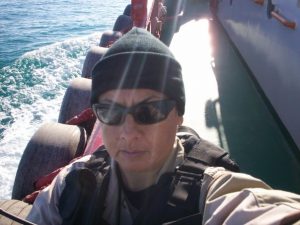Three years is a long time. Long enough for Olga Mireles to buy a house, learn how to fish, meet new friends, and ride her new Harley Davidson through San Diego County. But for some things, time is irrelevant. It’s been three years since Mireles came back home after serving in the military overseas. She still has flashbacks of war. A random sound can immediately trigger an anxiety attack. She doesn’t feel comfortable in big crowds and she keeps her weapon close when she’s at home. It’s not easy to transition back into civilian life. Sometimes a lifetime isn’t enough to completely adjust.
The mental scars are there, but there’s also physical hardships. She has a serious cough caused by working near oil refineries in her last deployment. She has sleep apnea, which causes her to wake up gasping for air.
“It’s definitely a process because you’re not dealing with just one factor,” explains Mireles. “When I got back, I secluded myself for about a month to have some time alone and reflect on everything.”
Mireles has served three tours overseas, one in Iraq, another in Kuwait, and her most recent in a location she would rather not publicize. She will say that one of her main responsibilities was to guard dangerous detainees. Men considered dangerous terrorism suspects who wouldn’t think twice about attacking civilians.
“Some detainees would throw feces and urine at American guards,” says Mireles with a matter of fact tone. “Over time, that can build up a lot of anger in someone. Then you hear about a friend who committed suicide. Sooner or later this starts to take its toll.”
The scars of war are all too real. According to the Department of Veteran Affairs, an estimated 22 veterans commit suicide every day in the United States. This tragic statistic has received a wave of attention recently through the 22 Pushup Challenge. The goal is for social media users to post videos of themselves doing 22 push ups to show support for veterans and their staggering suicide rate. With San Diego’s high military presence, the campaign hits home and is extremely relevant.
“Suicide isn’t easy to talk about, but it definitely still happens,” says Mireles. “When you’re overseas, you are part of one big dysfunctional family, but it’s your military family. When it’s time to come back home, you can feel completely lost.”
With such a high demand for support and services, the Department of Veterans Affairs can sometimes fall short. Organizations are stepping in to help veterans deal with the emotional, mental and even physical challenges that come with managing their transition into civilian life. One of those organizations is Courage to Call, a 24/7 hotline which helps veterans by connecting them with peers who have gone through similar experiences.
“Courage To Call averages approximately 150-175 calls a week,” says Jennifer Santis through a written response to La Prensa San Diego. “Often it isn’t just one specific thing. Symptoms may overlap. Military service members, veterans, military families can struggle with PTSD, suicidal thoughts, depression, or even co-occurring conditions.”
Mireles understands the price of war, but she also misses the camaraderie, purpose, and the adrenaline of military life in action. Five years ago, she shared her story with La Prensa San Diego. Her patriotism is still unwavering, but with an additional deployment under her belt, she can’t unsee the darkness she has witnessed. She can’t erase the pain she has experienced. The scars have selfishly earned their place on her body and in her mind. It is an experience she shares with thousands of veterans scattered across the U.S and abroad.
Her deep patriotism is ingrained in her DNA. Her father was in the military and so was her brother. She was planning on yet another deployment this past January, but her superiors denied it. After reviewing her file, they determined she needed more time to adjust to her new prescription drugs. She says the medication has helped to ease her depression and PTSD symptoms, but there’s still a long road ahead.
“I tried it all,” she says. “After Kuwait, I tried veteran programs, meditation, and even water therapy. Nothing quite fit. I had to find something that worked. All veterans need to find that happy place, where they can just relax, take their mind off the stress, and wind down.”
For those who are still struggling to readjust, Courage to Call urges veterans in need to call 211. The team also has Spanish speakers to help Hispanic veterans and their families.
“Courage to Call’s aid ranges from basic needs [like] housing, clothing, food, and utilities, transition support, money management,” says Santis “to legal help, employment, recreation, social enrichment, family support, counseling, and benefits information.”
Since Mireles was denied deployment, and deemed temporarily not physically qualified, she has developed plenty of hobbies. Veteran activities and groups also keep her active. War is never easy. Despite all the highs and lows of military life, Mireles says she doesn’t regret her 19 years of service. She still has one more year pending before she can retire.
Recently she started looking for a regular job. She’s open to different options, but she does have one specific preference.
“I started to send out applications,” she says. “I’m hoping for a job where I don’t have to take a gun to work every day.”
